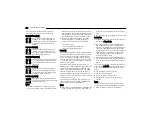
WARNING!
control. You could lose control of your vehicle and
have a collision.
●
When hauling cargo or towing a trailer, do not
overload your vehicle or trailer. Overloading can
cause a loss of control, poor performance or
damage to brakes, axle, engine, transmission,
steering, suspension, chassis structure or tires.
●
Safety chains must always be used between your
vehicle and trailer. Always connect the chains to
the hook retainers of the vehicle hitch. Cross the
chains under the trailer tongue and allow enough
slack for turning corners.
●
Vehicles with trailers should not be parked on a
grade. When parking, apply the parking brake on
the tow vehicle. Put the tow vehicle transmission in
PARK. For four-wheel drive vehicles, make sure the
transfer case is not in NEUTRAL. Always, block or
"chock" the trailer wheels.
●
GCWR must not be exceeded.
●
Total weight must be distributed between the tow
vehicle and the trailer such that the following four
ratings are not exceeded:
○
GVWR
○
GTW
○
GAWR
○
Tongue weight rating for the trailer hitch utilized
Towing Requirements — Tires
●
Do not attempt to tow a trailer while using a compact
spare tire.
●
Do not drive more than 50 mph (80 km/h) when
towing while using a full size spare tire.
●
Proper tire inflation pressures are essential to the
safe and satisfactory operation of your vehicle.
●
Check the trailer tires for proper tire inflation
pressures before trailer usage.
●
Check for signs of tire wear or visible tire damage
before towing a trailer.
●
Replacing tires with a higher load carrying capacity
will not increase the vehicle's GVWR and GAWR
limits.
●
For further information
.
Towing Requirements — Trailer Brakes
●
Do not interconnect the hydraulic brake system or
vacuum system of your vehicle with that of the
trailer.
●
An electronically actuated trailer brake controller is
required when towing a trailer with electronically
actuated brakes. When towing a trailer equipped
with a hydraulic surge actuated brake system, an
electronic brake controller is not required.
●
Trailer brakes are recommended for trailers over
1,000 lb (453 kg) and required for trailers in excess
of 2,000 lb (907 kg).
WARNING!
●
Do not connect trailer brakes to your vehicle's
hydraulic brake lines. It can overload your brake
system and cause it to fail. You might not have
brakes when you need them and could have an
accident.
(Continued)
WARNING!
●
Towing any trailer will increase your stopping
distance. When towing, you should allow for
additional space between your vehicle and the
vehicle in front of you. Failure to do so could result
in an accident.
CAUTION!
If the trailer weighs more than 1,000 lb (453 kg)
loaded, it should have its own brakes and they should
be of adequate capacity. Failure to do this could lead
to accelerated brake lining wear, higher brake pedal
effort, and longer stopping distances.
Integrated Trailer Brake Module (ITBM) —
If Equipped
Your vehicle may have an ITBM for electric and Electric
Over Hydraulic (EOH) trailer brakes.
NOTE:
This module has been designed and verified with
electric trailer brakes and new EOH systems. Some
previous EOH systems may not be compatible with
ITBM.
STARTING AND OPERATING 193
4





































